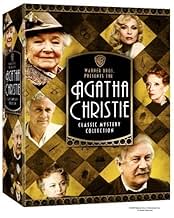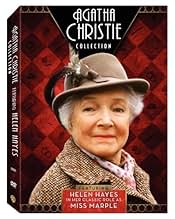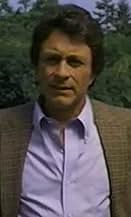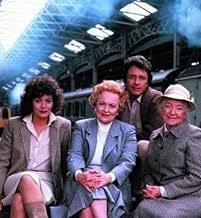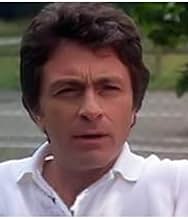NOTE IMDb
6,1/10
1 k
MA NOTE
Ajouter une intrigue dans votre langueAn American computer expert meets a distraught old lady on a train and she tells him that a homicidal maniac is stalking her quiet little village.An American computer expert meets a distraught old lady on a train and she tells him that a homicidal maniac is stalking her quiet little village.An American computer expert meets a distraught old lady on a train and she tells him that a homicidal maniac is stalking her quiet little village.
- Réalisation
- Scénario
- Casting principal
- Nommé pour 1 Primetime Emmy
- 1 nomination au total
Olivia de Havilland
- Honoria Waynflete
- (as Olivia De Havilland)
Gordon Lord
- King Edward
- (non crédité)
Avis à la une
Agatha Christie's 'Murder Is Easy' gets off to a brisk start with Helen Hayes as a little old lady on her way to Scotland Yard to report a series of murders in her village. She describes the look that made her realize who the murderer is and tells Bill Bixby, "If no one suspects you, murder is easy." Shortly after she leaves the train station, she is killed in an auto accident. Thus, Bixby decides to investigate for himself.
Carmen Culver's teleplay would have been better if it hadn't updated the Christie material and tried to modernize the story with foolish computer nonsense. Furthermore, by devoting entirely too much time to the red herrings and focusing almost all of the remaining time on Lesley-Anne Down and Bill Bixby's growing relationship, it turns the surprise ending into little more than a sham for which there is no preparation. Bill Bixby's character in the novel was a young policeman--here he is an American computer wizard who delves into use of the computer (to no avail) to solve the crime. He's charming and believable enough but too many scenes are throwaways involving him and Lesley-Anne Down.
Suffice it to say that this is not one of the best adaptations of Christie's work. The technical aspects are excellent--the color photography of the English settings is impressive and all of the performances are first-rate. Nice to see Olivia de Havilland and Helen Hayes as "special guest stars". Helen Hayes contributes so much to the opening scenes that she makes up for the fact that there is no Miss Marple in this one.
But the tight suspense of the final scenes in the novel when the murderer is caught and revealed is missing here and the explanations are too swift to carry much weight.
Still, an absorbing who-dun-it for mystery fans although modernizing the story with computer detection work is no help at all.
Carmen Culver's teleplay would have been better if it hadn't updated the Christie material and tried to modernize the story with foolish computer nonsense. Furthermore, by devoting entirely too much time to the red herrings and focusing almost all of the remaining time on Lesley-Anne Down and Bill Bixby's growing relationship, it turns the surprise ending into little more than a sham for which there is no preparation. Bill Bixby's character in the novel was a young policeman--here he is an American computer wizard who delves into use of the computer (to no avail) to solve the crime. He's charming and believable enough but too many scenes are throwaways involving him and Lesley-Anne Down.
Suffice it to say that this is not one of the best adaptations of Christie's work. The technical aspects are excellent--the color photography of the English settings is impressive and all of the performances are first-rate. Nice to see Olivia de Havilland and Helen Hayes as "special guest stars". Helen Hayes contributes so much to the opening scenes that she makes up for the fact that there is no Miss Marple in this one.
But the tight suspense of the final scenes in the novel when the murderer is caught and revealed is missing here and the explanations are too swift to carry much weight.
Still, an absorbing who-dun-it for mystery fans although modernizing the story with computer detection work is no help at all.
Agatha Christie's 1939 story has been updated to the Eighties and it's hero/protagonist made an American allowing for the casting of Bill Bixby as Luke Williams, mathematical genius and computer programmer. He takes a fateful ride on a British commuter train and meets up with Helen Hayes who has an important errand to run.
Helen's a talkative old biddy who is worried that there have been a number of strange deaths in her small village recently and she fears that village constable Freddie Jones isn't quite up to a homicide investigation. She's confides in Bixby and then gets run down by a hit and run driver as she leaves the train.
Bixby's mathematical mind can't take in the random probabilities of all this coincidence and it intrigues him. He goes back to Hayes's village and turns detective, annoying village constable Jones, but finding romance with Lesley Anne Down and a host of suspects and a couple more deaths before the mystery is solved.
Among other inhabitants at the village is the local librarian Olivia DeHavilland and Timothy West who owns several newspapers. It's a pity that the story called for Helen Hayes to be killed off immediately so there could be no scenes with DeHavilland and Hayes.
As this story was written in 1939 I suspect that Agatha Christie had Lord Beaverbrook in mind for Timothy West's character. Audiences in 1982, especially American ones couldn't possibly appreciate the satire that Christie was employing with West as the tyrannical ego-maniacal newspaper publisher. Still I suspect citizens of the United Kingdom of the older generations knew quite well who West's character was modeled on.
I don't think the updating especially hurt the story however. The cast does very well by their roles and it's an intriguing film and idea that Helen Hayes voices.
Helen's a talkative old biddy who is worried that there have been a number of strange deaths in her small village recently and she fears that village constable Freddie Jones isn't quite up to a homicide investigation. She's confides in Bixby and then gets run down by a hit and run driver as she leaves the train.
Bixby's mathematical mind can't take in the random probabilities of all this coincidence and it intrigues him. He goes back to Hayes's village and turns detective, annoying village constable Jones, but finding romance with Lesley Anne Down and a host of suspects and a couple more deaths before the mystery is solved.
Among other inhabitants at the village is the local librarian Olivia DeHavilland and Timothy West who owns several newspapers. It's a pity that the story called for Helen Hayes to be killed off immediately so there could be no scenes with DeHavilland and Hayes.
As this story was written in 1939 I suspect that Agatha Christie had Lord Beaverbrook in mind for Timothy West's character. Audiences in 1982, especially American ones couldn't possibly appreciate the satire that Christie was employing with West as the tyrannical ego-maniacal newspaper publisher. Still I suspect citizens of the United Kingdom of the older generations knew quite well who West's character was modeled on.
I don't think the updating especially hurt the story however. The cast does very well by their roles and it's an intriguing film and idea that Helen Hayes voices.
Pretty good mystery. Lesley-Anne Down has never looked better and Bill Bixby portrays the hapless American well enough. Plot twists abound and the viewer is left with a very satisfying mystery. Agatha Christie would approve!
American adaptations of Agatha Christie (especially for television) tend to be on the low end of the scale. It's principally the writing, secondarily the directing – i.e. the writers and directors mold the Christie work into something they *think* American audiences want instead of giving us what we actually *do* want – which, when it comes to English murder mysteries, is the same thing the English want.
So, I was greatly taken by surprise so see that *this* adaptation of *Murder is Easy* was NOT bad. It is not grade 'A' quality by a long shot; but it is definitely a high 'B' grade. And it is certainly more faithful to the original than the 2008 adaptation (which has a lot of *very* bizarre flights of fancy that do NOT make for a better story; just a bizarre one).
In this version, Luke is not a retired policeman from India but a computer expert from America; but the age difference is the same (or at least Bixby was 20 years older than Down, which is the age difference in the novel). Lavinia Pinkerton has become Lavinia Fullerton for some reason, but she's killed the same way under either surname. Gordon Ragg, Lord Whitfield (no known relation to June) has become Lord Easterfield (in full credit, Lord Gordon Easterfield; but Easterfield would be his lordship, not his surname - so he might still be a Ragg, at least by birth). Honoria Waynflete, Rose Humbleby, and the rest (so far as I can tell) are all the same.
The plot develops steadily and cleanly, as the suspense slowly builds. As in the novel, Luke believes the killer is a certain individual – which, of course, is a classic signal to reader and viewer that it must be someone else; but who? Ah, therein lies the mystery – and when the identity of the killer is finally revealed, it *is* a surprise (unless, of course, you have already read the book) because it is somebody whom nobody would suspect.
And as long as nobody suspects you ... Murder is Easy.
Side Note for Radio Fans: The best adaptation of this novel to date (November 2016) is one that was done a few years ago for BBC Radio 4 by Joy Wilkinson. It stars Patrick Baladi (New Tricks, Poirot), Lydia Leonard (The 39 Steps - 2008 version), Michael Cochrane (Downton Abbey), Marcia Warren (Agatha Raisin, Dangerfield), and a lot of other very good British actors that most Americans will not have heard of.
So, I was greatly taken by surprise so see that *this* adaptation of *Murder is Easy* was NOT bad. It is not grade 'A' quality by a long shot; but it is definitely a high 'B' grade. And it is certainly more faithful to the original than the 2008 adaptation (which has a lot of *very* bizarre flights of fancy that do NOT make for a better story; just a bizarre one).
In this version, Luke is not a retired policeman from India but a computer expert from America; but the age difference is the same (or at least Bixby was 20 years older than Down, which is the age difference in the novel). Lavinia Pinkerton has become Lavinia Fullerton for some reason, but she's killed the same way under either surname. Gordon Ragg, Lord Whitfield (no known relation to June) has become Lord Easterfield (in full credit, Lord Gordon Easterfield; but Easterfield would be his lordship, not his surname - so he might still be a Ragg, at least by birth). Honoria Waynflete, Rose Humbleby, and the rest (so far as I can tell) are all the same.
The plot develops steadily and cleanly, as the suspense slowly builds. As in the novel, Luke believes the killer is a certain individual – which, of course, is a classic signal to reader and viewer that it must be someone else; but who? Ah, therein lies the mystery – and when the identity of the killer is finally revealed, it *is* a surprise (unless, of course, you have already read the book) because it is somebody whom nobody would suspect.
And as long as nobody suspects you ... Murder is Easy.
Side Note for Radio Fans: The best adaptation of this novel to date (November 2016) is one that was done a few years ago for BBC Radio 4 by Joy Wilkinson. It stars Patrick Baladi (New Tricks, Poirot), Lydia Leonard (The 39 Steps - 2008 version), Michael Cochrane (Downton Abbey), Marcia Warren (Agatha Raisin, Dangerfield), and a lot of other very good British actors that most Americans will not have heard of.
Bill Bixby, not actually turning into the Incredible Hulk, tries to solve the deaths of citizens in one of those quaint English villages where murderers seem to thrive. A nice fair adaption of a fun Christie book with pretty Leslie Anne and a hefty Olivia huffing and puffing thru the scenery. She's a wicked gas here.
Le saviez-vous
- AnecdotesThis film was the only film in Bill Bixby's long career that was entirely filmed outside of the United States.
- GaffesAt the beginning of the film, Luke Williams is seen in a compartment of a loco hauled train. The shots of the train on the journey alternate between this train and an Intercity HST125 which always used open carriages which did not have compartments.
- Citations
Bridget Conway: [to Miss Waynflete] O why do you walk through fields in gloves O fat white woman whom nobody loves?
- ConnexionsReferences Jim'll Fix It (1975)
Meilleurs choix
Connectez-vous pour évaluer et suivre la liste de favoris afin de recevoir des recommandations personnalisées
Détails
- Date de sortie
- Pays d’origine
- Langue
- Aussi connu sous le nom de
- Agatha Christie's 'Murder Is Easy'
- Lieux de tournage
- Sociétés de production
- Voir plus de crédits d'entreprise sur IMDbPro
Contribuer à cette page
Suggérer une modification ou ajouter du contenu manquant




